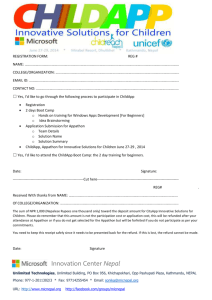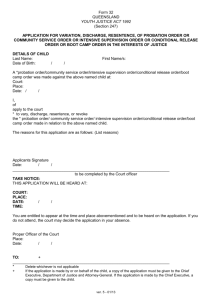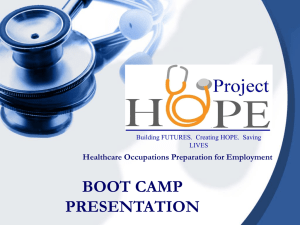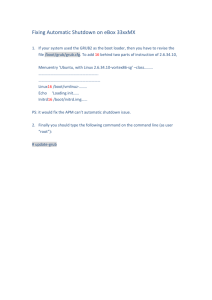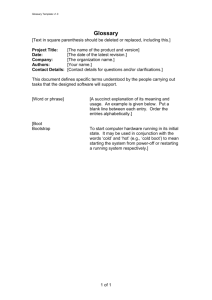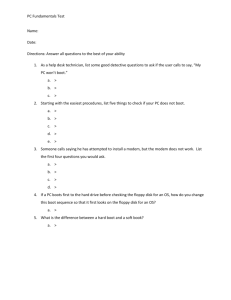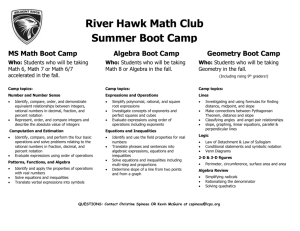INTRODUCTION - Clinical Skills Managed Educational Network
advertisement
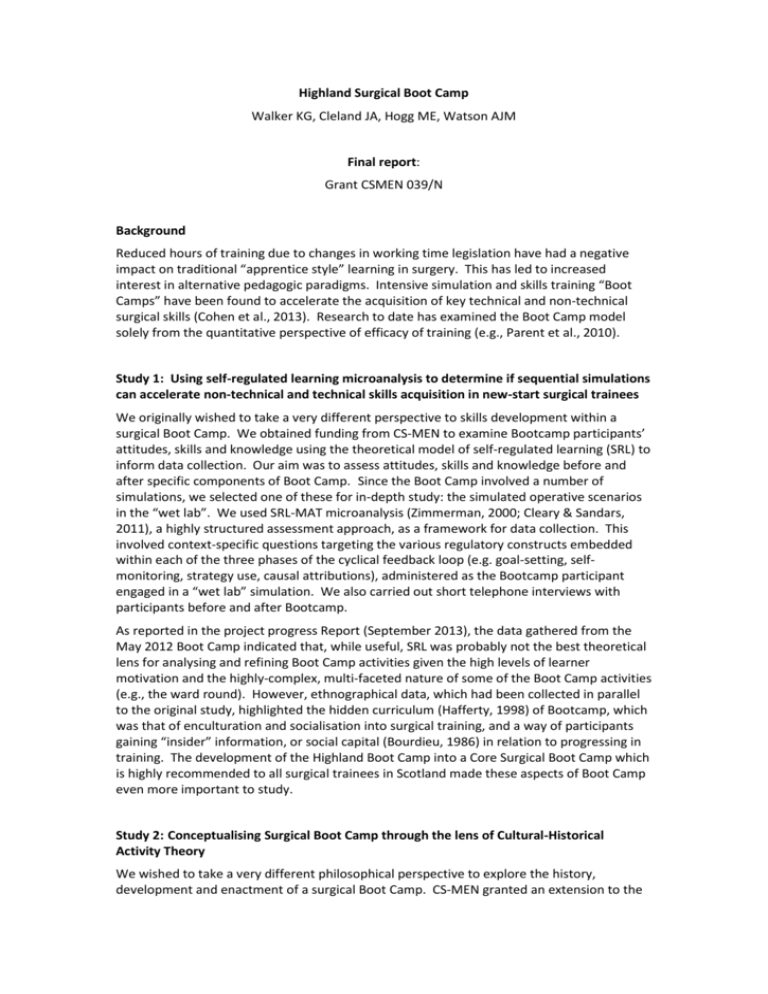
Highland Surgical Boot Camp Walker KG, Cleland JA, Hogg ME, Watson AJM Final report: Grant CSMEN 039/N Background Reduced hours of training due to changes in working time legislation have had a negative impact on traditional “apprentice style” learning in surgery. This has led to increased interest in alternative pedagogic paradigms. Intensive simulation and skills training “Boot Camps” have been found to accelerate the acquisition of key technical and non-technical surgical skills (Cohen et al., 2013). Research to date has examined the Boot Camp model solely from the quantitative perspective of efficacy of training (e.g., Parent et al., 2010). Study 1: Using self-regulated learning microanalysis to determine if sequential simulations can accelerate non-technical and technical skills acquisition in new-start surgical trainees We originally wished to take a very different perspective to skills development within a surgical Boot Camp. We obtained funding from CS-MEN to examine Bootcamp participants’ attitudes, skills and knowledge using the theoretical model of self-regulated learning (SRL) to inform data collection. Our aim was to assess attitudes, skills and knowledge before and after specific components of Boot Camp. Since the Boot Camp involved a number of simulations, we selected one of these for in-depth study: the simulated operative scenarios in the “wet lab”. We used SRL-MAT microanalysis (Zimmerman, 2000; Cleary & Sandars, 2011), a highly structured assessment approach, as a framework for data collection. This involved context-specific questions targeting the various regulatory constructs embedded within each of the three phases of the cyclical feedback loop (e.g. goal-setting, selfmonitoring, strategy use, causal attributions), administered as the Bootcamp participant engaged in a “wet lab” simulation. We also carried out short telephone interviews with participants before and after Bootcamp. As reported in the project progress Report (September 2013), the data gathered from the May 2012 Boot Camp indicated that, while useful, SRL was probably not the best theoretical lens for analysing and refining Boot Camp activities given the high levels of learner motivation and the highly-complex, multi-faceted nature of some of the Boot Camp activities (e.g., the ward round). However, ethnographical data, which had been collected in parallel to the original study, highlighted the hidden curriculum (Hafferty, 1998) of Bootcamp, which was that of enculturation and socialisation into surgical training, and a way of participants gaining “insider” information, or social capital (Bourdieu, 1986) in relation to progressing in training. The development of the Highland Boot Camp into a Core Surgical Boot Camp which is highly recommended to all surgical trainees in Scotland made these aspects of Boot Camp even more important to study. Study 2: Conceptualising Surgical Boot Camp through the lens of Cultural-Historical Activity Theory We wished to take a very different philosophical perspective to explore the history, development and enactment of a surgical Boot Camp. CS-MEN granted an extension to the grant to carry out a full ethnographic study of the first national Boot Camp in 2014. Thus, grounded in social constructivism and consistent with the theoretical lens of culturalhistorical activity theory (CHAT: Engeström et al., 1999), we used a rapid ethnographic approach (Savage, 2000) involving observations, semi-structured formal interviews with faculty and field interviews with students and faculty to understand the relationships and processes of the re-branded Scottish Surgical Boot Camp (SSBC). Results Our empirical data highlighted the centrality of the political, social and geographic contexts to the vision, development, aims, objectives and positioning of SSBC within national surgical training. Interviews with faculty provided a clear picture of how the activity system of SSBC had transformed over time in response to the trainee voice, financial tensions and the interacting system of surgical training requirements. For example, it was clear that tensions between the original aims and objectives of the Boot Camp and changes in surgical training, led to change (Engstrom, 1987): re-branding and re-positioning (from a Highland Surgical Boot Camp, where participants were self-funding and self-selecting, to an SSBC, which was recommended by the surgical training provider, and funded) had been essential to the evolution and survival of Boot Camp. Surgeons and participants (surgical trainees) were connected within a different social context from their “day roles” as they acted together in pursuit of the same an object, of developing and developing as capable surgical trainees. Multi-voiced feedback, from trainees from earlier Boot Camps, as well as Faculty, had lead to change in Boot Camp activities and the tools used to mediate these activities (this was particularly obvious in the Ward Round where distractions had been pared down and standardised). Within the SSBC, there were clear rules and expectations, division of labour, and social and skills-focused learning objectives. Discussion and conclusion This case study gives a unique insight into the complexity of interacting influences within a SSBC, which we believe enables a better description and understanding of the SSBC and how it has evolved within the bigger picture of core surgical training. Like all qualitative work, the data is highly contextualised. However, we can draw out generalizable messages to inform postgraduate training more widely, in terms of the importance of being cognisant of how different systems (in this case core surgical training and Boot Camp) interact with each other and how no educational innovation occurs in social, historical or cultural isolation. We are grateful to CS-MEN for allowing us to shift the focus of our research so dramatically in response to the empirically-based argument for doing so, which we provided in the interim report. Finance Grant CSMEN 039/N awarded Jan 2012 Total sum £3900.00 Projected costs at time of application:Porcine tissues (Fresh Tissue Supplies) External faculty travel & accommodation Instruments (Scotmed) Sutures (Ethicon) Actors Fees Researcher expenses for collation & analysis of data Conference expenses TOTAL £540.00 £600.00 £550.00 £210.00 £800.00 £700.00 £500.00 £3900.00 Remittance received from CSMEN June 2012: £1950.00 Actual spend at Jan 2015:2012: Porcine tissues External faculty travel & accommodation Instruments (Scotmed) Sutures (Covidien) Actors Fees 2014-15 Porcine tissues External faculty travel and accomodation Actors fees Transcription of interviews Researcher travel and accommodation £129.50 £229.75 £607.11 £210.00 £200.00 £606.00 £514.95 £400.00 £152.00 £308.40 TOTAL £3357.31 Remaining funds for conference expenses £542.69 Dissemination Further data illustrating the usefulness of CHAT as a means of developing, critiquing and evaluating this educational activity will be presented at the SCSN, Dumfries, April 2015, and the 5th NHS Education for Scotland Annual Medical Education Conference, Edinburgh, also April 2015, and has been submitted for the Association of Medical Educators in Europe in Glasgow, October 2015. A paper is in preparation for submission to an appropriate journal, such as Medical Education. References Bourdieu P. (1986). The forms of capital. In Richardson J (Ed), Handbook of Theory and Research for the Sociology of Education, pp241-258. New York: Greenwood Press. Cleary TJ, Sandars, J. (2011). Assessing self-regulatory processes during clinical skill performance: A pilot study. Medical Teacher; 33: e368-e374. Cohen ER, Barsuk JH, Moazed F, Caprio T, Didwania A, McGaghie WC. (2013). Making July Safer: Simulation-Based Mastery Learning During Intern Boot Camp. Academic Medicine; 88:233-239. Engeström Y. (1987). Learning by expanding: an activity-theoretical approach to developmental research. Helsinki: Orienta-Konsultit, 1987. Engestrom Y, Miettinen R, Punamaki R. (1999). Activity Theory and Individual and Social Transformation. Perspectives on Activity Theory. Cambridge: Cambridge University Press. Hafferty FW. (1998). Beyond curriculum reform: confronting medicine's hidden curriculum. Academic Medicine; 73: 403-407. Parent RJ, Plerhoples TA, Long EE, et al. (2010). Early, Intermediate, and Late Effects of a Surgical Skills “Boot Camp” on an Objective Structured Assessment of Technical Skills: A Randomized Controlled Study. J Am Coll Surg; 210: 984-989. Savage J. (2000). Ethnography and healthcare. BMJ 321; 1400. Zimmerman BJ. 2000. Attaining self-regulation: A social-cognitive perspective. In: Boekaerts M, Pintrich P, Zeidner M, editors. Handbook of self-regulation. Orlando, FL: Academic Press. pp 13–39. KGW / JC Feb 2015
